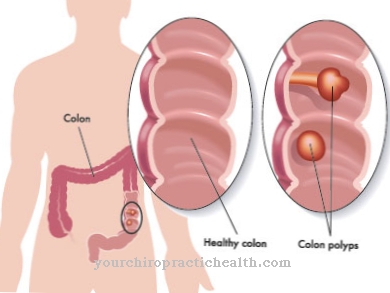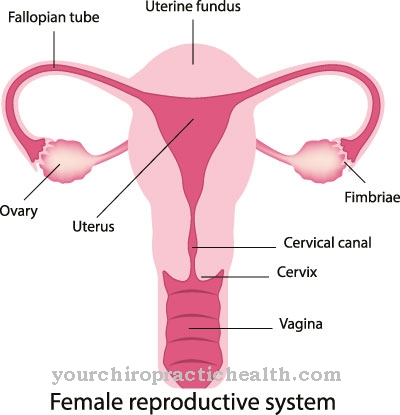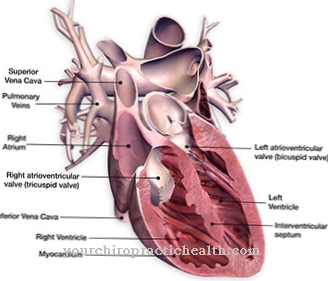The Verner-Morrison Syndrome is characterized by an extremely rare malignant tumor of the pancreas. The tumor produces an increased amount of a hormone also known as a vasoactive intestinal peptide. The main symptom of the disease is severe persistent diarrhea, which can also have fatal consequences due to the extreme loss of water.
What is Verner-Morrison Syndrome?
The Verner-Morrison Syndrome represents a very rare neuroendocrine tumor of the pancreas. It is a tumor of the neuroendocrine system, which includes the nervous system and the endocrine system. This tumor is also known as VIPoma because it produces an increased amount of the hormone VIP.
VIP is the abbreviation for vasoactive intestinal peptide. This hormone consists of 28 amino acids and acts as a neurotransmitter in the central nervous system. It ensures the relaxation of the smooth muscles of several organs. These include the bronchi, windpipe, stomach or intestines. At the same time, it is also an important vasodilator, which means that it is also responsible for the expansion of blood vessels.
When the stomach and intestinal muscles relax, water is released in the small intestine. It also restricts the production of hydrochloric acid in the stomach. This results in massive diarrhea that is similar to cholera. The symptom of a lack of stomach acid is known as achlorhydria. Overall, Verner-Morrison syndrome occurs in only one in ten million people.
90 percent of the tumor affects the pancreas. In the remaining ten percent of patients, it is located in the trunk of the spinal cord, in the adrenal glands or in the bronchi. The prognosis of the disease depends on whether metastases have already formed.
causes
Little is known about the causes of Verner-Morrison syndrome. It is the malignant degeneration of D1 cells in the pancreas. The D1 cells have the task of producing the VIP hormone. Under physiological conditions, VIP synthesis is subject to hormonal regulatory mechanisms. Among other things, growth hormone has an inhibitory effect on the formation of VIP.
However, the tumor produces the hormone largely independently and autonomously from these regulatory mechanisms. The VIP hormone is a neurotransmitter that is responsible for transmitting signals in the central nervous system. As part of this function, it inhibits the production of gastric acid and increases the formation of the basic HCO3 anion. The result is an increased secretion of water from the small intestine.
If this hormone is produced in large quantities, the amount of water excreted in the intestine is so high that those affected lose an average of three liters of water a day through the intestines. In extreme exceptional cases, up to 20 liters of water can be excreted. As a result, the body is threatened with dehydration and a severe loss of potassium.
The VIP hormone also has an inhibitory effect on gastric acid production. It also supports the hormonal antagonist of insulin, glucagon, in increasing blood sugar levels. In the long term, diabetes mellitus can also occur.
Symptoms, ailments & signs
The characteristic symptom of Verner-Morrison syndrome is massive and persistent diarrhea, which manifests itself in a manner similar to that of cholera. The great loss of fluid in the body and the hypokalemia cause diarrhea, abdominal cramps and states of confusion.
Other symptoms include muscle cramps, severe fatigue, vomiting and irregular heartbeat. The disease can be fatal. Loss of fluid is the greatest risk factor here. In some cases, metastases develop in the liver. Once the formation of metastases has started, the prognosis for the disease becomes less favorable.
Diagnosis & course of disease
Diagnosing Verner-Morrison syndrome is difficult because the disease is so rare. The suspicion of VIPom is often not even expressed. However, if there is persistent and massive diarrhea that does not go away, Verner-Morrison syndrome should also be considered. The determination of Chromogranin A also provides valuable information.
Because this substance is produced by all neuroendocrine tumors. If the diagnosis is suspected, blood tests for the hormone VIP are carried out. If the VIP level is very high, this gives a strong indication of VIPoma. The determination of Chromogranin A also provides valuable information. Because this substance is produced by all neuroendocrine tumors. The tumor can then be easily detected by imaging tests such as CT and MRI.
Complications
In Verner-Morrison syndrome, those affected primarily suffer from very severe diarrhea. This has a very negative effect on the patient's quality of life and makes everyday life considerably more difficult. As a rule, those affected lose a lot of fluid as a result, which in turn can lead to severe dehydration and deficiency symptoms if the nutrients are not otherwise substituted.
There is also muscle cramping and adeptness. In general, those affected suffer from impaired consciousness and can also completely lose consciousness. As it progresses, Verner-Morrison syndrome leads to vomiting and heart problems. If treatment is not received, the disease can also lead to the death of the patient. Metastases develop in the liver, which can ultimately lead to cancer in other regions.
There are no other complications in treating Verner-Morrison syndrome. Depending on the patient's condition, the tumor may be removed. A complete healing does not occur, however, so that the life expectancy of the patient is considerably reduced due to the Verner-Morrison syndrome. There are usually severe side effects, especially when using chemotherapy.
When should you go to the doctor?
Since the Verner-Morrison syndrome cannot cure independently, the person affected should definitely consult a doctor. The earlier treatment is given, the better the further course of the disease is usually. In the worst case, the affected person dies from the consequences of Verner-Morrison syndrome if it is not treated. A doctor should be contacted for this disease if the patient suffers from persistent diarrhea. This diarrhea also cannot be stopped with ordinary medication and occurs for no particular reason.
Furthermore, there is also permanent confusion or severe cramps in the muscles, which also indicate the disease. In some cases, people also have heart problems or pain in the heart. If the symptoms of Verner-Morrison syndrome occur, the person affected should contact an internist or a general practitioner. Further treatment usually takes place in a hospital by a specialist. The illness may lead to a significantly reduced life expectancy, so that psychological treatment would also be useful.
Treatment & Therapy
Treatment for Verner-Morrison syndrome depends on the condition of the tumor. If the tumor is detected early, there is a good chance that metastases have not yet formed. In this case, complete cure can be achieved through the surgical removal of the tumor. If there are already metastases, an operation no longer makes sense.
Then there is the option of treating the tumor with chemotherapy. However, the success of chemotherapy is extremely questionable. The growth of the cancer can be halted for a while. The two drugs ocreotide and streptozotocin are available for the drug treatment of VIPoma. Ocreotide works similarly to the growth hormone somastatin.
It inhibits the production of the pancreatic hormones. Streptozotocin has a different mode of action. This substance works by blocking the cells of the pancreas. Only fewer VIPs are produced in the process. While these drugs cannot cure the condition, they are a good way to slow the growth of the tumor. Chemotherapy is carried out with cytostatics such as 5-fluorouracil, which disrupts the structure of the nucleic acids.
prevention
There is no recommendation to prevent Verner-Morrison syndrome. The causes of the degeneration of the D1 cells are not yet known.
Aftercare
Follow-up care for Verner-Morrison syndrome depends on the therapy. After an operation, rest and rest. Another physical exam will take place during follow-up. Imaging is used to determine whether additional metastases are present. If the tumors do not metastasize and do not recur, no further follow-up care is required.
All the patient has to do is make use of the check-up appointments that are typical for cancer. These usually take place every three months, then every six months and then every two years. Further aftercare measures depend on the individual course of the disease. As part of the follow-up care, any prescribed pain medication and other preparations must be discontinued or carefully tapered.
This depends on the patient's state of health and the course of the disease. Usually several follow-up appointments are necessary before the medication can be completely discontinued and the patient can be discharged. Comprehensive follow-up care is required after chemotherapy.
The patient sometimes needs therapeutic support. Again, bed rest and rest are important. In addition, any consequences of chemotherapy are clarified. Depending on the results of the examinations, further treatment measures may then be necessary. Aftercare for Verner-Morrison syndrome is carried out by the respective specialist doctor. After a surgical procedure, the surgeon or the chief physician is responsible.
You can do that yourself
Verner-Morrison syndrome primarily requires medical treatment. The therapy of the malignant tumor can be supported by a number of self-help measures.
First of all, it is important to avoid stress. Patients should take great care of themselves and otherwise adhere to the doctor's instructions. These usually also concern the intake of sufficient fluid, as the tumor leads to severe dehydration. The diet should also be changed. We recommend bland foods, which may have to be supplemented with food supplements. If pain or other complaints occur, the doctor must be informed. It is important to refrain from physical activity during the acute phase of the illness. After surgery, moderate exercise can aid healing.
However, because of its location in the stomach, Verner-Morrison syndrome has a negative impact on gastric acid production. This can lead to persistent gastrointestinal discomfort. The diet should therefore also be maintained beyond the treatment. The doctor responsible can call in a nutritionist who can provide further tips and measures. With early treatment, supported by the self-help measures mentioned, the tumor disease disappears completely in many cases.




.jpg)







.jpg)



.jpg)










.jpg)
